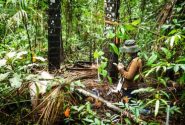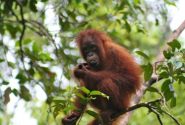
The chief of a tribe in Brazil has won one of five forest hero awards for his work on forest preservation in the Amazon. CIAT/Neil Palmer
ISTANBUL, Turkey (19 April, 2013) – Five people named “Forest Heroes” at an awards ceremony at the U.N.Forum on Forests (UNFF) in Istanbul take very different approaches in the fight to preserve forests.
Rose Mukankomeje has dedicated her life to protection and restoration of Rwanda’s forests through a program named Umuganda, ensuring their growth supports livelihoods and the poor.
Scientist Ariel Lugo from U.S. commonwealth Puerto Rico oversees a project aimed at preventing violence and promoting healthy childhood development by encouraging young people to plant trees.
Preecha Siri has helped enlist a community in Thailand to create a model ecosystem management village by integrating wet terrace fields, rotational farming, beekeeping, native tea and bamboo farming with forest conservation.
Turkish businessman Hayrettin Karaca left his successful textiles business to pursue his passion for environmentalism, establishing an arboretum in 1980 that now holds over 14,000 species. He also founded TEMA, one of Turkey’s foremost environmental non-governmental organizations (NGOs), after witnessing the dangers of forest degradation during his travels, earning him the sobriquet “Grandfather Earth”.
As chief of the Paiter-Surui tribe in Brazil, Almir Narayamoga Surui has fought to safeguard his tribe and the Amazon Rainforest for more than 20 years — now he’s creating a 50-year plan to oversee conservation efforts, reforestation projects and sustainable economic projects.
A panel of judges selected the winners from among almost 600 entries from 68 countries.
Jan McAlpine, director of the UNFF secretariat, noted the enormous range and diversity of those nominated and the passion and knowledge that each of them represented.
“Through their eyes we see that there are creative pathways to realizing that we are an integral part of forests and forests are a vital part of us all,” McAlpine said. “Their stories are our shining inspiration and they our heroes.”
At the awards ceremony, Karaca spoke about the challenges facing environmentalists.
Speaking through an interpreter, he urged delegates at the forum to “ensure the survival of what we need to survive”.
Karaca warned of the “twin monsters” of economics and politics, which he said threaten conservation efforts, telling conference attendees that a forest should be managed as an ecosystem, not as a collection of trees.
Wearing a brightly-coloured feather headdress , Almir — who used Google Earth to record and map the stories of his tribe’s elders in the Amazon — spoke about the responsibilities he assumed on becoming chief at just 17 years of age:
“The kind of decisions I had to take I thought were very difficult, but at the same time they were very necessary because I was helping to decide the future of the tribe,” Almir said.
Lugo, who has published more than 470 articles, extolled the benefits of urban nature.
We want you to share Forests News content, which is licensed under Creative Commons Attribution-NonCommercial-ShareAlike 4.0 International (CC BY-NC-SA 4.0). This means you are free to redistribute our material for non-commercial purposes. All we ask is that you give Forests News appropriate credit and link to the original Forests News content, indicate if changes were made, and distribute your contributions under the same Creative Commons license. You must notify Forests News if you repost, reprint or reuse our materials by contacting forestsnews@cifor-icraf.org.











